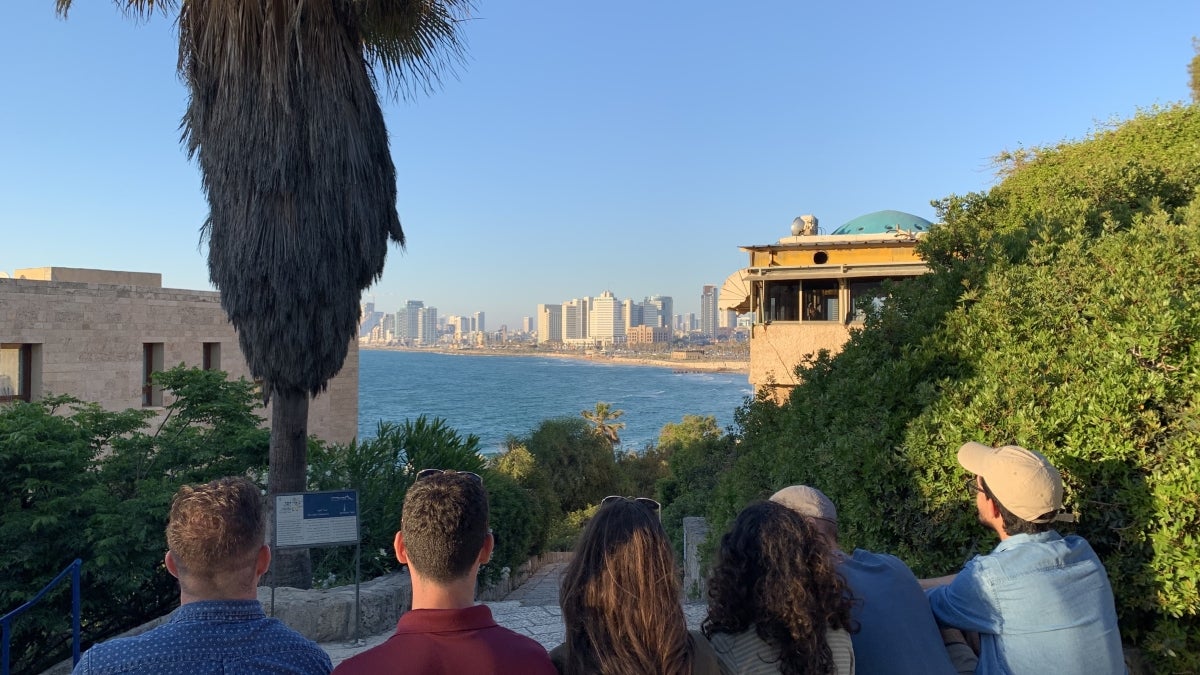ASU students experience Israel and West Bank to study democracy, leadership, civility

Students from the School of Civic and Economic Thought visited Israel and the West Bank this summer to explore diverse views about Israeli-Palestinian conflict, practice service and leadership and reflect on the differences in the democracies of Israel and the United States.
Israel and the West Bank offered the latest opportunity for students in The College’s School of Civic and Economic Thought and Leadership to grapple with complex political ideas.
Twelve students from Arizona State University visited the region shortly after the end of the spring 2019 semester. The trip represented a first-of-its-kind experience to explore diverse views about the Israeli-Palestinian conflict, practice service and leadership and reflect on the differences in the democracies of Israel and the United States.
The nine-day Global Intensive Experience is part of a series of courses in the school about democracies around the world. The course provides three credits toward degrees or minors in civic and economic thought and leadership. The trip challenged the students to assess their own views about justice, democracy, conflict and leadership through a blend of readings, meetings with Israeli and Palestinian leaders and activists and immersive experiences.
"We designed the course so that American students could encounter political polarization and conflict in another liberal democracy, and reflect on our own political polarization so that they might become leaders who contribute to more constructive political and civic activity,” said Paul Carrese, director of the School of Civic and Economic Thought and Leadership. “The blending of service activities with exposure to both Israeli and Palestinian leaders seeks to reinforce a commitment to reasonable disagreement and taking practical steps to resolve competing claims about justice and rights."
Julia Jackman, a biochemistry and global health major planning to graduate in 2021, said the trip gave her an appreciation for the differences between groups in Israel. But rather than being satisfied with what she has seen, she wants to continue to learn more about the region.
“I am more curious than ever and want to hear more perspectives, more facts and more stories from the people who live through this reality every day,” she said.
Jackman also stayed in Israel after the course to undertake an internship supported by the school with the African Refugee Development Center.
A unique learning opportunity
This immersive course took the students and two ASU faculty to important political, economic and religious sites in Israel and the West Bank, including Tel Aviv, East and West Jerusalem, Bethlehem and Jericho.
The course readings and field components were designed to provide students with a glimpse into the democratic system of Israel and the leadership challenges for a liberal democracy immersed in conflict. Among other experiences, the group shared a Shabbat dinner in a Tel Aviv home, spoke with an imam at the Dome of the Rock/Al Aqsa Mosque in Jerusalem, interviewed politicians from across the political spectrum and met with a joint Israeli-Palestinian peace project.
The cohort also visited important sites for both Israeli and Palestinian communities including the Western Wall in Jerusalem, the barrier wall around East Jerusalem, an eighth-century Islamic palace near Jericho and Yad Vashem, Israel’s Holocaust memorial. Conversations with Jewish settlers, Palestinian community organizers, a rabbi with a background in political philosophy and soldiers in the Israeli Defense Forces added to the many narratives students were asked to consider.
A public service mission
Each of the School of Civic and Economic Thought and Leadership’s Global Intensive Experience courses includes a service component. For this trip, the ASU students and faculty worked with children in a Jewish-Muslim kindergarten and harvested wheat at a Palestinian farm that hosts an educational project about political rights.
After the course concluded, the students were asked to reflect on their deepened understanding of the challenges and rewards of leadership and global awareness in the 21st century, as well as the challenges of being a citizen and leader in a liberal democracy.
“This benefited my educational experience by allowing me to search for answers beyond the American context,” said Justin Heywood, a double major of civic and economic thought and leadership and political science.
“I am more convinced than ever that social connection must be incentivized and encouraged in order to find a solution to this conflict. There will be no peace without trust,” Heywood added.
Discovering other world democracies
The School of Civic and Economic Thought and Leadership’s Global Intensive Experiences programs are sponsored in part by the school to make them more accessible for the school’s major and minor students. Last year, students embarked on a 10-day journey to India, where they studied ways in which the nation’s religious, economic and cultural diversity impacts the world’s largest democracy. And in 2021, the school is developing a trip to South Africa to focus on democratic transition.
“I learned a tremendous amount about myself and my opinions through the many discussions and debates we had over the nine days. I was grateful to have been able to get a taste of the country and the ongoing conflict prior to spending the summer in Tel Aviv on my own,” Jackman said. “In the end, I also feel like I gained a much greater appreciation for international relations and perspectives.”
To learn more about the 250-plus study-abroad programs in more than 65 different countries offered at ASU, see the Study Abroad Office website.
More Law, journalism and politics
Can elections results be counted quickly yet reliably?
Election results that are released as quickly as the public demands but are reliable enough to earn wide acceptance may not…
Spring break trip to Hawaiʻi provides insight into Indigenous law
A group of Arizona State University law students spent a week in Hawaiʻi for spring break. And while they did take in some of the…

LA journalists and officials gather to connect and salute fire coverage
Recognition of Los Angeles-area media coverage of the region’s January wildfires was the primary message as hundreds gathered at…

